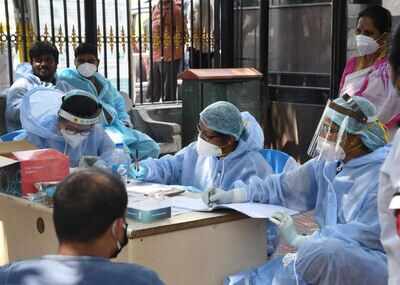
Coronavirus: As migrants go home, ICMR ramps up testing
by TNNNEW DELHI: Taking cognisance of the expected surge in Covid-19 cases due to influx of migrant workers in states like Uttar Pradesh, Bihar, West Bengal and Odisha, the Indian Council of Medical Research (ICMR) is working to scale up testing facilities and capacities.
Testing capacity - already increased to 1.4 lakh samples per day - is now being further raised to 2 lakh samples per day, the council said. It said the government has devised an "intelligent testing strategy" to remain ahead of the virus by scaling up its preparedness to fight the Covid-19 pandemic, after taking lessons from the 2009 swine flu outbreak which had "exposed glaring gaps" in the country's diagnosis infrastructure. Although the country's public health infrastructure still remained inadequate to the enormity of the pandemic, the difference this time was the improvisations and additions the government made as it tried to tackle a virus whose behaviour remains uncertain.
The country now has 610 laboratories - 432 public and 178 private ones - which are testing 1.1 lakh samples daily.
Keeping in view the revised understanding of the virus and the research work being done in India and elsewhere, testing criteria has been progressively widened to include returnees from abroad, migrant labourers and Covid-19 frontline workers.
More on Covid-19
- Coronavirus pandemic: Complete Coverage
- Lockdown 4.0: What's allowed and what's not in the three zones
- It's time to mask up and stay safe: Join TOI's #MaskIndia campaign
- MHA's guidelines for home isolation
- Trust the newspaper for your daily verified news
ICMR said most states have been working with the National Tuberculosis Elimination Program (NTEP) to deploy TrueNAT machines for Covid-19 testing. Through this machine, testing is done in such areas or districts where modern virological laboratories in private or public sectors don't exist.
"All possible institutions, both in the public sector or private, like laboratories, universities and private medical colleges were identified," a source said, pointing out that "intelligent testing strategy" to trace and track the virus and anticipate where testing would be required also involved resources like labs in defence facilities, centres engaged in S&T development as well as veterinary labs being "repurposed" to suit the need. This also resulted in relief to the testing infrastructure as it was not overwhelmed in any state. "No state has a significant backlog of samples to be tested," the ICMR said, adding, "More labs are being set up and additional machines are being deployed in states like UP, Bihar, West Bengal as well as the rest of the country to meet possible higher requirements."
Sources termed the "difficult decision of lockdown" as part of the larger plan to slow down the spread of the virus and use the time thus gained to prepare healthcare infrastructure "to trace, track, test, quarantine, treat and save precious lives of people". The results can be seen in the steady increase in the number of labs, growing availability of locally developed testing kits and a pool of personnel equipped to carry out not just tests but also handle biomedical waste.